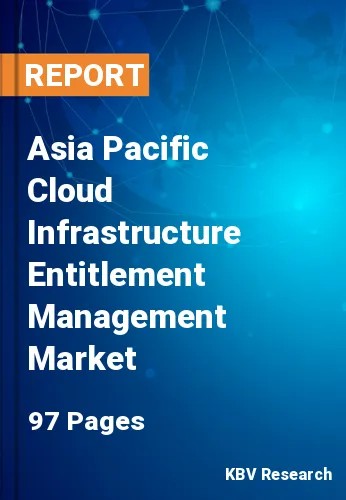The Asia Pacific Cloud Infrastructure Entitlement Management Market would witness market growth of 43.8% CAGR during the forecast period (2023-2030).
In CIEM, access rights, permissions, and privileges given to users, programs, and services that communicate with cloud-based resources & services are managed. The main goal of CIEM is to guarantee that users have the right amount of authority and access to carry out their duties within the cloud infrastructure while abiding by security standards, compliance rules, and best practices. It assists businesses in setting up and enforcing fine-grained access restrictions, tracking and auditing user behavior, and reducing the risk of illegal access and data breaches.
There is a greater emphasis on cloud security as cloud services are being adopted more widely. Modern companies are expanding processes and the workloads, applications, and data they are connected with across platforms from cloud service providers like Microsoft Azure, Google Cloud Platform (GCP), and Amazon Web Services (AWS). Modern companies continue moving more of their core operations to the cloud. All of these factors may be present in some multi-cloud settings.
The Shanghai Municipal People's Government claims that as China develops artificial intelligence (AI) and cloud services in environmentally friendly and sustainable ways, the multi-cloud trend aligns with China's national plans to advance its digital economy and industrial transformation. Over the next five years in Asia Pacific, the average number of public clouds used by businesses is predicted to rise to 3.2 from the current average of 2.2. Business adoption of multi-cloud environments is currently at about 70% in this region (and at 72% in China), and during the next five years, that percentage is anticipated to reach 80%.
The Department of Information and Communications Technology of the Philippines used a cloud-based solution in 2017 to automate its business permits and licensing system. Similarly, the Department for Communities and Social Inclusion in the Australian state of South Australia was able to deploy a single platform and automate contract administration and the handling of payment transactions to nongovernment organizations employing a cloud platform that offers software as a service, cutting the time it took to process payments from 4-6 weeks to under three days. The region also has a proliferating telecommunication sector. Thus, the region is adopting cloud-based services across various sectors, propelling the demand for and growth of the market in the Asia Pacific.
The China market dominated the Asia Pacific Cloud Infrastructure Entitlement Management Market by Country in 2022, and would continue to be a dominant market till 2030; thereby, achieving a market value of $1,239 Million by 2030. The Japan market is exhibiting a CAGR of 43% during (2023 - 2030). Additionally, The India market would register a CAGR of 44.9% during (2023 - 2030).
Based on Offering, the market is segmented into Solution and Professional Services. Based on Vertical, the market is segmented into BFSI, IT & ITeS, Retail & eCommerce, Healthcare, Telecommunications and Others. Based on countries, the market is segmented into China, Japan, India, South Korea, Singapore, Malaysia, and Rest of Asia Pacific.
Free Valuable Insights: The Worldwide Cloud Infrastructure Entitlement Management Market is Projected to reach USD 15.7 Billion by 2030, at a CAGR of 42.8%
The market research report covers the analysis of key stake holders of the market. Key companies profiled in the report include Microsoft Corporation, CyberArk Software Ltd., Palo Alto Networks, Inc., Check Point Software Technologies Ltd., BeyondTrust Corporation, Rapid7, Inc., NextLabs, Inc., Radware Ltd., EmpowerID, Inc., and One Identity LLC (Quest Software, Inc.)
By Offering
By Vertical
By Country
Our team of dedicated experts can provide you with attractive expansion opportunities for your business.

